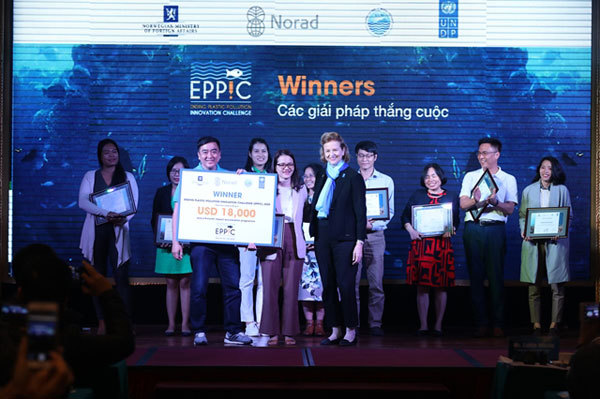 |
| UNDP Resident Representative in Vietnam, Caitlin Wiesen (front right) presents award to a winner at the ASEAN-wide Ending Plastic Pollution Innovation Challenge. — Photo courtesy of UNDP |
The United Nations Development Programme (UNDP), the Ministry of Natural Resources and Environment (MONRE), the Vietnam Administration of Sea and Islands (VASI), the Norwegian Agency for Development Cooperation (Norad), and the Norwegian Ministry of Foreign Affairs have announced the four winners of the ASEAN-wide Ending Plastic Pollution Innovation Challenge (EPPIC) to combat plastic waste in Ha Long Bay and Koh Samui (Thailand).
EPPIC, which was launched in June 2020 in Ha Long City, drew 159 teams from Vietnam, Thailand, Indonesia, the Philippines, Singapore, and Malaysia to the challenge with a broad range of solutions to tackle plastic pollution.
Fourteen teams were selected as the EPPIC finalists and undertook a three-month incubation programme combining technical training about the circular economy, waste management, and business development skills with field trips to Ha Long Bay and Koh Samui.
The finalists contributed to accelerating the transition to a circular economy of plastic in the ASEAN region with solutions to address plastic pollution, such as alternative materials, recycling technologies, models that foster re-use, community-based clean-ups, education campaigns and mobile apps.
The four EPPIC winners are Galaxy Biotech, Green Joy and Refill Day from Vietnam, and CIRAC from Thailand.
The firms have each been awarded a US$18,000 grant to apply the solutions in Ha Long Bay and Koh Samui, and will be enrolled in a nine-month impact acceleration programme delivered by UNDP Impact Aim, with opportunities to connect with impact investing firms and other key development players in ASEAN.
In the coming months, UNDP and VASI will work with the local authorities in Ha Long Bay and Koh Samui for the implementation of the innovations selected and incubated by the EPPIC project.
The aim is to support the uptake of these innovations into the project sites and accelerate the scale-up and replication of these solutions in Vietnam, Thailand, and ASEAN states to contribute to reducing plastic pollution.
Director General of the Vietnam Administration of Seas and Islands (VASI), Ta Dinh Thi said: “The results of the competition show the diffusion of the spirit of environmental protection and the responsibility of the community to solve the current global problem, plastic waste – a requirement throughout the sustainable development process.”
“The EPPIC winners have pitched outstanding, innovative ideas to tackle plastic pollution and we are keen to working with them and our partners from the Governments of Vietnam and Thailand to implement the solutions in Ha Long Bay and Koh Samui,” said UNDP Resident Representative in Vietnam, Caitlin Wiesen.
“We are also delighted to extend the EPPIC Challenge to Indonesia and the Philippines and welcome all innovators from ASEAN to apply. We believe there is a significant opportunity for innovators from ASEAN countries to play a leading role in the fight against plastic pollution,” she said.
“Norad is proud to support UNDP Vietnam’s Ending Plastic Pollution Innovation Challenge (EPPIC), as a part of Norway’s development programme to combat marine litter. We need to come together, collaborate, and innovate to stop plastic pollution from reaching our oceans. We are impressed with these entrepreneurs' commitment to creating healthier environments and good jobs in a circular economy by reducing plastic pollution” said Stig Ingemar Traavik, Director for the Department for Climate, Energy and Environment of Norad. VNS
|
The Ending Plastic Pollution Innovation Challenge (EPPIC) is a two and half-year project funded by the Norwegian Agency for Development Cooperation (Norad). The first component of the EPPIC will focus on tackling local pollution challenges in ASEAN by selecting, supporting, incubating, and scaling up the best and most innovative solutions. The second component will contribute to building Vietnam’s capacity to combat this growing challenge, as well as strengthening networks and knowledge exchange between ASEAN countries. About the 2020 EPPIC challenge sites Ha Long Bay, a UNESCO World Heritage Site located in Quang Ninh Province, is one of Vietnam’s most popular travel destinations, receiving 14 million visitors in 2019. The province generates 1,397 tonnes of domestic solid waste daily, of which approximately from 12 to 18 per cent is plastic. About 34 tonnes of waste is generated from tourism alone on a daily basis, some of which is simply thrown into the sea by travellers. Ha Long Bay is also home to a large fish-farming industry with 20,600 fish-ponds and 9,600 fish cages, meaning equipment such as buoys and fishing nets are among the most common plastic items that are being lost or discarded into the environment. Koh Samui (Samui Island) is the largest island in an archipelago located off the northeastern coast of Surat Thani Province in Thailand. This very famous tourist destination welcomed more than 2.5 million visitors in 2017 but possesses limited waste management systems to manage the approximately 10,800 tonnes of plastic waste that are generated there annually. |

Sanitation workers battle rubbish in Ha Long Bay
A sanitation team in Ha Long Bay is working hard to collect a huge amount of rubbish on the beach while dealing with poor attitude from some of the visitors.

Ha Long to pilot banning plastic products on tourist boats
Ha Long Bay Management Board has made an agreement with 15 service providers to pilot a ban on plastic products on tourist boats starting from August 1.
